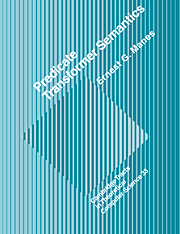
-
Select format
-
- Publisher:
- Cambridge University Press
- Publication date:
- January 2010
- August 1992
- ISBN:
- 9780511569821
- 9780521616102
- Dimensions:
- Weight & Pages:
- Dimensions:
- (247 x 174 mm)
- Weight & Pages:
- 0.426kg, 236 Pages
You may already have access via personal or institutional login
Book description
A central problem in the design of programming systems is to provide methods for verifying that computer code performs to specification. This book presents a rigorous foundation for defining Boolean categories, in which the relationship between specification and behaviour can be explored. Boolean categories provide a rich interface between program constructs and techniques familiar from algebra, for instance matrix- or ideal-theoretic methods. The book's distinction is that the approach relies on only a single program construct (the first-order theory of categories), the others being derived mathematically from four axioms. Development of these axioms (which are obeyed by an abundance of program paradigms) yields Boolean algebras of 'predicates', loop-free constructs, and a calculus of partial and total correctness which is shown to be the standard one of Hoare, Dijkstra, Pratt, and Kozen. The book is based in part on courses taught by the author, and will appeal to graduate students and researchers in theoretical computer science.
Contents
Metrics
Full text views
Full text views help Loading metrics...
Loading metrics...
* Views captured on Cambridge Core between #date#. This data will be updated every 24 hours.
Usage data cannot currently be displayed.
Accessibility standard: Unknown
Why this information is here
This section outlines the accessibility features of this content - including support for screen readers, full keyboard navigation and high-contrast display options. This may not be relevant for you.
Accessibility Information
Accessibility compliance for the PDF of this book is currently unknown and may be updated in the future.


